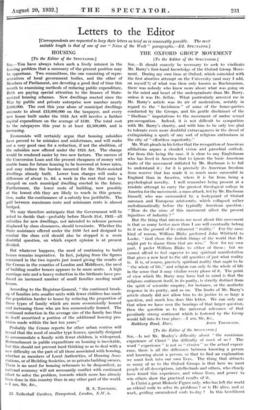Letters to the Editor
[Correspondents are requested to keep their letters as brief as is reasonably possible. The M921 suitable length is that of one of our " News of the Week " paragraphs.—Ed. SrEcraToa.1 HOUSING •
[To the Editor of the SrEcranna.1 Sia,—You have always taken such a lively interest in the housing problem that a summary of the present position may be opportune. Two committees, the one consisting of repre- sentatives of local government bodies, and the other of Members of Parliament, are devoting a good deal of time this month to examining methods of reducing public expenditure. Both are paying special attention to the finance of State- assisted housing schemes. New dwellings erected since the War by public and private enterprise now number nearly 2,000,000. The cost this year alone of municipal dwellings amounts to about £13,000,000 on the taxpayer, and every new house built under the 1924 Act will involve a further capital expenditure on the average of £130. The total cost to the ratepayers this year is at least £2,500,000, and is increasing.
Economists will certainly argue that housing subsidies have proved to be mistakes and misfortunes, and will make out a very good case for a reduction, if not the abolition, of the subsidies now offered under the 1924 Act. The change would be rendered easier by two new factors. The success of the Conversion Loan and the present cheapness of money will enable loans for future housing to be borrowed at lower rates, and may reduce the burden incurred for the State-assisted dwellings already built. Lower loan charges will make a difference of about is. 6d. a week in the rent that may be charged on each municipal dwelling erected in the future. Furthermore, the lower costs of building, now possibly at the lowest ebb they are likely to reach in this genera- tion, make the continuance of a subsidy less justifiable. The gulf between maximum costs and minimum rents is almost bridged.
We may therefore anticipate that the Government will be asked to decide that—probably before March 31st, 1933—all subsidies for new dwellings, not intended to rehouse persons displaced by slum clearances, should terminate. Whether the State assistance offered under the 1930 Act and designed to combat the slum evil should also be stopped is a more doubtful question, on which expert opinion is at present divided.
But whatever happens, the need of continuing to build homes remains imperative. In fact, judging from the figures contained in the two reports just issued giving the results of the Census in the counties of London and Middlesex, the need of building smaller houses appears to be more acute. A high marriage rate and a heavy reduction in the birthrate have pro- duced an increased number of small families needing small homes.
According to the Registrar-General, " the continued break- up of families into smaller units with fewer children has made the population harder to house by reducing the proportion of those types of family which are more economically housed and increasing those who are less economically housed. The continued reduction in the average size of the family has thus in itself amortized a portion of the additional housing pro- vision made, within the last ten years."
Probably the Census reports for other urban centres will reveal that the need of smaller type houses, specially designed to accommodate a family with fewer children, is widespread. Retrenchment in public expenditure on housing is inevitable, but this should not prevent hard thinking so as to deal with a new difficulty on the part of all those associated with housing, whether as members of Local Authorities, of Housing Asso- ciations, or of Building Societies, or as private building owners. There is no need for housing reformers to be despondent, as national economy will not necessarily conflict with continued effort to solve the problem, towards which more has already been done in this country than in any other part of the world. —I am, Sir, &c., B. S. TOWNILOE.
53 Netherhall- Gardens, Hampstead, London, N.W.






























 Previous page
Previous page